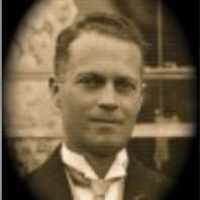DOCTOR OF SCIENCE (HONORIS CAUSA )
 William Hofmeyer Craib was born in 1895 in Somerset East, where he received his school education at Gill College and matriculated with the highest marks in the Cape. In 1914 he obtained a B.A. degree with distinctions in Mathematics, Applied Mathematics and Physics at the South African College, Cape Town, and was awarded a bursary for study overseas.
William Hofmeyer Craib was born in 1895 in Somerset East, where he received his school education at Gill College and matriculated with the highest marks in the Cape. In 1914 he obtained a B.A. degree with distinctions in Mathematics, Applied Mathematics and Physics at the South African College, Cape Town, and was awarded a bursary for study overseas.
After World War I had interrupted his studies (and he had distinguished himself as a soldier, as is evidenced by the award to him of the Military Cross amongst other decorations), he continued studying at the University of Cambridge and at Guy's Hospital, London, obtaining his medical degrees in 1923.
He devoted the years from 1925 to 1930 to research - first at Johns Hopkins Hospital, Baltimore, and later at University College Hospital, London. After being awarded the degree of Doctor of Medicine by the University of Cambridge, he returned to South Africa in 1931 to take up a practice.
In 1932 he was appointed Professor of Medicine at the University of the Witwatersrand, a position he held for 14 years.
Dr Craib's career has been one of devoted service to the community in many varied fields. He has served in an advisory position on a wide variety of commissions and councils. During World War II he was Consultant Physician to the South African Forces. In 1963 he was appointed Associate Adviser on Medical Research to the Council for Scientific and Industrial Research and from 1965 to 1970 was Vice-President of that body with Medical Research as his special responsibility.
Since 1972 he has been a member of the Scientific Advisory Council of the Prime Minister.
Dr Craib's contributions to science in general and to the whole community have been widely recognised and he has been honoured by the award of various honorary degrees and other marks of the high esteem in which he is held. However, in the field of electro-cardiology, Dr Craib had to wait long for the rightful recognition of his contribution to science.
It was in the late nineteen-twenties that he made exciting discoveries about the fundamental origins of electricity in the human heart. His findings were so far advanced, however, that they were unacceptable to the medical scientists of the time.
It has been only in recent years that the scientific world has come to appreciate and recognise how important a breakthrough Dr Craib's discoveries were in the field of electro-cardiology and that he has been acclaimed for them by scientists throughout the world, receiving for example an award in 1976 from the European Congress of Cardiology in Amsterdam.
In regard to Dr Craib's work, one of the leading electro-cardiologists in the world has written: "..... some minds are prone to be guided by divine inspiration and that young man, in his intense search, came to understand the activation process of the heart as no one else before."
The Council and the Senate of the University of Port Elizabeth count it a privilege to honour Dr Craib in this way.